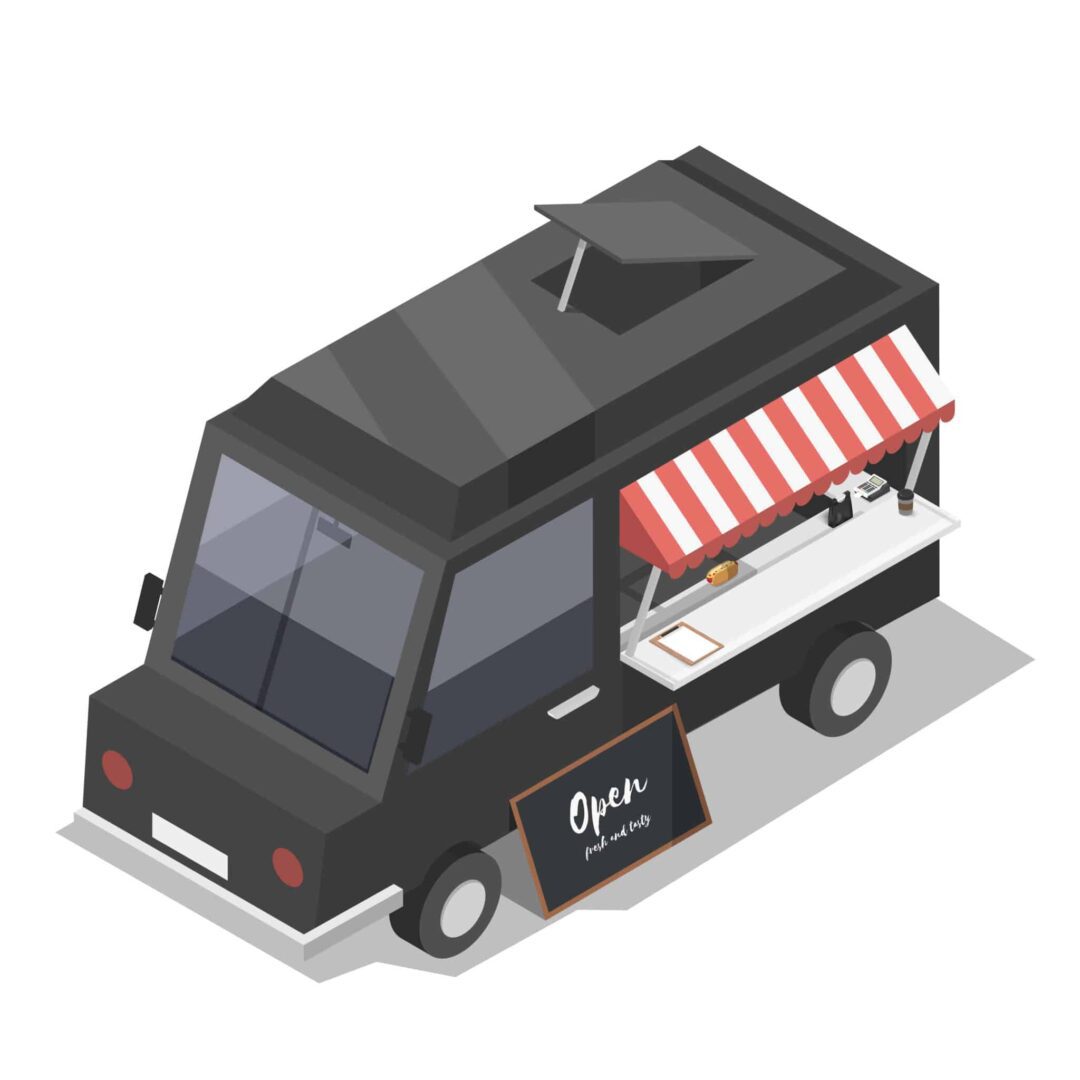Food trucks have become a ubiquitous sight in cities across the globe, offering a diverse range of delectable cuisines right at your fingertips. From gourmet burgers to artisanal ice creams, these mobile eateries have revolutionized the way we experience food on-the-go. If you want to start a food truck business, you might be wondering how much money you can make. In this article, we will look at the factors that make food trucks successful. We will study industry trends and important things to consider, so you can understand how profitable this business can be.

The popularity of food trucks
Food trucks have witnessed a tremendous surge in popularity over the past decade. With their unique and convenient dining experience, food trucks have captured the attention of people from all walks of life. One reason for their popularity is the diverse range of culinary options they offer. From gourmet burgers to extravagant cuisines, food trucks cater to every taste bud and dietary preference.
Moreover, the low start-up costs associated with a food truck business make it an attractive venture for aspiring entrepreneurs. Compared to traditional brick-and-mortar restaurants, setting up a mobile kitchen on wheels requires significantly less investment in terms of real estate and infrastructure. This affordability factor has allowed individuals with limited financial resources to enter the thriving food industry.
Furthermore, the ability of food trucks to adapt quickly and move around different locations has contributed to their rising popularity. By attending events such as music festivals, fairs, or farmers’ markets, these mobile eateries can reach a large number of potential customers in one go. The flexibility offered by operating on wheels also allows owners to explore various neighborhoods and target different customer segments based on demand.
In conclusion, the popularity of food trucks can be attributed to their diverse culinary offerings, affordable start-up costs, and mobility advantages. As more people seek unique dining experiences at reasonable prices, this trend is expected to continue growing in the foreseeable future.
The initial investment required
The initial investment required to start a food truck business can vary greatly depending on several factors. First and foremost, the cost of purchasing or leasing a food truck is one of the biggest expenses. The price of a new food truck can range from $50,000 to over $200,000, while used ones may be available for as low as $20,000. Additionally, outfitting the truck with the necessary kitchen equipment and appliances can add another significant expense.
Apart from the actual truck and equipment costs, there are several other financial considerations when starting a food truck business. Permits and licenses are essential and often come with associated fees that vary depending on location. Marketing costs such as creating a website or social media presence should also be taken into account. Furthermore, stocking up on initial ingredients and supplies to kickstart your menu will require upfront investment.
Starting a food truck business costs money. But remember, how much money you make depends on different things like where you park your truck, what food you sell, how you advertise, and how many people want your food. Do some research and make a budget to figure out how much money you’ll need before you start this fun adventure!
Operating costs and expenses
Operating costs and expenses are crucial factors to consider when determining the profitability of a food truck business. These costs include various elements such as vehicle maintenance, fuel expenses, permits and licenses, insurance, and equipment purchases. Vehicle maintenance is an ongoing expense that includes regular oil changes, tire rotations, and repairs. Fuel expenses depend on the distance traveled and the efficiency of the vehicle’s engine.

Permits and licenses are required for legal operation of a food truck business and often come with associated fees. Insurance is also necessary to protect against potential liabilities or damages that may occur during operation. Additionally, purchasing necessary equipment such as cookware, utensils, refrigerators, grills, generators, etc., can significantly impact operating costs.
In addition, the food truck business has other important expenses like buying ingredients for cooking, which depends on the menu items they offer. If they need extra help with cooking or serving customers, they also have to pay staff wages. By carefully looking at these costs and comparing them to the money they make from sales, they can figure out how profitable their business is.
Potential revenue streams and profit margins
Food trucks make money by selling food. They can earn a lot of money by offering a variety of food that many people like. Food trucks can also serve different places during the day, which helps them reach more customers and sell more food.
Another potential revenue stream for food trucks is catering services. Many food truck owners offer catering options for events such as weddings, corporate functions, and parties. This allows them to tap into a different market segment and potentially earn higher profits compared to regular street sales. By providing convenient and delicious meals on-site, food trucks can become popular choices for event organizers looking for unique dining experiences.
In terms of profit margins, food truck businesses generally have lower overhead costs compared to traditional brick-and-mortar restaurants. They don’t require expensive rent or extensive interior design investments. To calculate profit margins, you need to think about costs like buying ingredients, maintaining equipment, paying licensing fees, and staff wages. But if you manage your food truck business well, you can still make good profits by being flexible in choosing profitable locations and reducing costs.
Factors affecting profitability
Factors affecting profitability in the food truck business can be numerous and varied. One important factor is location. The choice of where to set up a food truck can greatly impact its profitability. A prime location with high foot traffic and visibility can attract more customers, leading to increased sales and ultimately higher profits. On the other hand, a poor or inconvenient location may result in fewer customers and lower revenues.

Competition affects profitability. If there are many food trucks offering the same food, it can be hard to stand out and get customers. This can lead to lower sales and less profit. On the other hand, if there is less competition or if the food truck offers unique menu items, it can attract more customers and make more profit.
Other factors that can influence profitability include operating costs such as ingredient costs, fuel expenses, permits and licenses fees, equipment maintenance, and labor costs. Efficient inventory management practices can also impact profitability by minimizing waste and optimizing ingredient usage. Additionally, marketing strategies play a crucial role in attracting new customers and retaining existing ones, directly impacting sales volume and overall profitability.
Success stories from food truck entrepreneurs
Food truck businesses have become increasingly popular in recent years, and many entrepreneurs have found great success in this industry. One inspiring success story is that of Juan and Maria, a couple who started their food truck business with just a small investment. They focused on offering unique and delicious Mexican street food, which quickly gained a loyal following. With their dedication and hard work, Juan and Maria were able to not only make a profit but also expand their business by opening multiple food trucks in different locations.
Another remarkable success story is that of David, who turned his passion for BBQ into a thriving food truck empire. Starting with just one truck and his secret family recipe for mouthwatering ribs, David quickly gained popularity among the locals. As word spread about the quality of his barbecue dishes, demand grew exponentially. This led David to open multiple food trucks across the city and even launch his own line of signature BBQ sauces and rubs. Today, he is recognized as one of the most successful food truck entrepreneurs in the industry.
Food truck businesses can be very profitable when combined with passion, hard work, and innovative ideas. However, it takes dedication and perseverance to overcome challenges like competition and unpredictable weather. These success stories show that with determination, individuals can turn their dreams into reality and achieve financial success.
Conclusion: Is a food truck business profitable?
A food truck business can be profitable if done right. It may seem easy and profitable, but it takes planning, hard work, and persistence to succeed. Factors like location, menu, and customer service affect profits. Calculating costs, such as startup expenses, permits, fuel, maintenance, and employee wages, ensures profitability. Research, smart decisions, and precautions are necessary for a profitable food truck business. Before starting, do market research, create a strong business plan, and seek advice from industry experts or experienced individuals.


